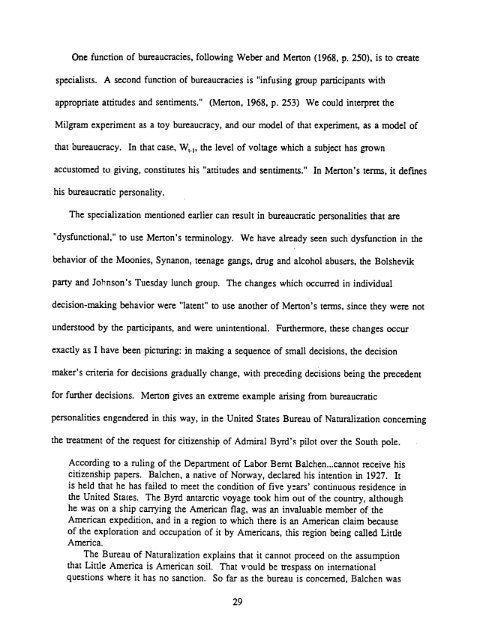INSTITUTE FOR
INSTITUTE FOR
INSTITUTE FOR
You also want an ePaper? Increase the reach of your titles
YUMPU automatically turns print PDFs into web optimized ePapers that Google loves.
One function of bureaucracies, following Weber and Merton (1968, p. 250), is to create<br />
specialists. A second function of bureaucracies is "infusing group participants with<br />
appropriate attitudes and sentiments." (Merton, 1968, p. 253) We could interpret the<br />
Milgram experiment as a toy bureaucracy, and our model of that experiment, as a model of<br />
that bureaucracy. In that case, W,.,, the level of voltage which a subject has grown<br />
accustomed to giving, constitutes his "attitudes and sentiments." In Merton's terms, it defines<br />
his bureaucratic personality.<br />
The specialization mentioned earlier can result in bureaucratic personalities that are<br />
"dysfunctional," to use Merton's terminology. We have already seen such dysfunction in the<br />
behavior of the Moonies, Synanon, teenage gangs, drug and alcohol abusers, the Bolshevik<br />
party and Johnson's Tuesday lunch group. The changes which occurred in individual<br />
decision-making behavior were "latent" to use another of Merton's terms, since they were not<br />
understood by the participants, and were unintentional. Furthermore, these changes occur<br />
exactly as I have been picturing: in making a sequence of small decisions, the decision<br />
maker's criteria for decisions gradually change, with preceding decisions being the precedent<br />
for further decisions. Merton gives an extreme example arising from bureaucratic<br />
personalities engendered in this way, in the United States Bureau of Naturalization concerning<br />
the treatment of the request for citizenship of Admiral Byrd's pilot over the South pole.<br />
According to a ruling of the Department of Labor Bernt Balchen...cannot receive his<br />
citizenship papers. Balchen, a native of Norway, declared his intention in 1927. It<br />
is held that he has failed to meet the condition of five years' continuous residence in<br />
the United States. The Byrd antarctic voyage took him out of the country, although<br />
he was on a ship carrying the American flag, was an invaluable member of the<br />
American expedition, and in a region to which there is an American claim because<br />
of the exploration and occupation of it by Americans, this region being called Little<br />
America.<br />
The Bureau of Naturalization explains that it cannot proceed on the assumption<br />
that Little America is American soil. That would be trespass on international<br />
questions where it has no sanction. So far as the bureau is concerned, Bachen was<br />
29
















